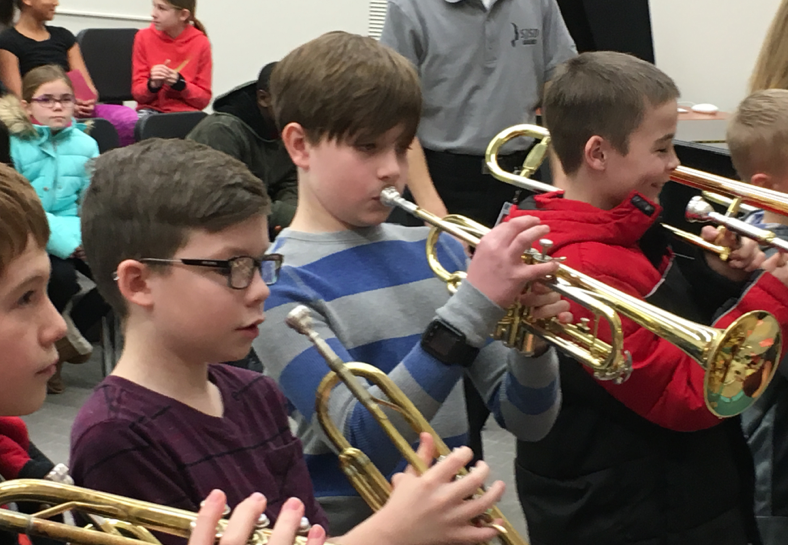Why Kids Quit Music Lessons (and What We Can Do About It)
By Jason Riley, Director – St. Joseph Arts Academy
We believe few things in life are more joyful than making music. So why do so many young students give up on it?
At the Academy, we see firsthand how powerful music can be in a young person’s life. But we also recognize a hard truth: many students abandon music altogether after just a few years—or even months—of lessons. And it’s not because they don’t like music. It’s often because they don’t like how it’s taught.
In fact, most kids love music… just not “music lessons.”
Play vs. Practice
Let’s face it: what do athletes do? They play sports. What do actors do? They play roles. What do musicians do? We play music. Play is joyful, natural, and self-motivated. But somewhere along the way, music lessons can lose that sense of play. They become another chore, another item on a busy to-do list.
If we want kids to stick with music—and more importantly, to love it—we need to make sure the play is front and center. Yes, skills matter. Structure matters. But if joy disappears from the process, motivation soon follows.
Why They Quit: Common Patterns We See
Over the years, we’ve seen several factors that can lead kids to step away from music—and they’re usually not what parents expect.
1. The Language We Use Matters
When we call it a “lesson,” it sounds like school. When we say “practice,” it sounds like homework. We don’t want to play word games, but we do want to rethink the message we’re sending. At SJAA, we’re starting to talk more about “playing time” instead of “practice time.” It’s a small shift, but it matters.
2. Over-scheduling and Burnout
Music becomes just one more scheduled activity in a packed week. With limited energy, many students disengage—not because they don’t enjoy music, but because they’re overwhelmed. When playing music feels like pressure instead of passion, the love fades.
3. Parental Pressure (even the well-meaning kind)
Parents want the best for their children—but sometimes the best intentions backfire. Encouragement can sound like judgment. Helping can feel like hovering. At SJAA, we encourage parents to support from the sidelines—ask questions, listen to their kids play, and celebrate progress (even when it’s small).
4. Perfection Culture
Auditions, recitals, and competitions can be exciting and motivating—but they can also introduce a heavy sense of comparison and fear. When perfection becomes the goal, students become afraid to make mistakes—and that’s when creativity dies.
5. Focusing Only on Achievement
We’ve all seen the articles: “Music makes you better at math,” “Piano boosts IQ.” While it’s true that music enhances many academic and life skills, those benefits are secondary. When we treat music like a résumé booster, we risk stripping it of its soul. The real benefit of music is music itself.
6. A Narrow View of What Music Is
We love the classical tradition. We teach it and celebrate it. But music is bigger than the works of long-dead geniuses. Our students also love pop, rock, jazz, movie soundtracks, video game themes, and writing their own songs. When students see music as a living, breathing artform—not just a history lesson—they stay engaged.
A Personal Note
A personal note from me: I didn’t stop playing or taking lessons after childhood—in fact, my journey with guitar began with some hesitation. My parents were a bit reluctant to invest in an instrument at first, worried I wouldn’t practice enough or that it might be a waste. And honestly, in those earliest years, I wasn’t the best practicer. It took me a while to really become obsessed with playing, and even longer to figure out how to practice effectively.
There was a stretch of a couple years without a teacher, but I found my way with encouragement from friends and even teachers outside of music. Over time, I experienced multiple exciting growth spurts, as well as periods where progress plateaued and felt stagnant. I burned out, then reignited my passion again and again—sometimes through new teachers, sometimes by exploring new styles, or chasing fresh opportunities.
This ebb and flow, the ups and downs, have been a big part of my musical life. And it’s exactly the kind of lifelong, evolving relationship with music that I want for every student here at the Academy. It really is a fun journey. Music is never done with you.
So What Can We Do?
We’ll talk more soon about how we’re actively shifting our approach at SJAA to reflect these ideas. We want to inspire teachers to nurture joyful musicianship, empower families to be supportive partners, and help students find their own voice through music.
Because when music is meaningful, it lasts a lifetime.
Stay tuned for part two—“How We Keep Music Fun (and Students Playing!)”

